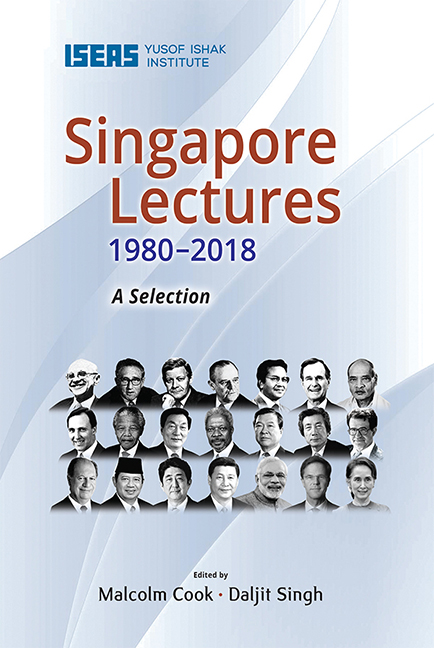Book contents
- Frontmatter
- Contents
- Introduction
- 1 The Invisible Hand in Economics and Politics
- 2 American Foreign Policy: A Global View
- 3 The Soviet Union: Challenges and Responses as Seen from the European Point of View
- 4 Trends in the International Financial System
- 5 Regionalism, Globalism and Spheres of Influence: ASEAN and the Challenge of Change into the 21st Century
- 6 US Policy in the Asia-Pacific Region: Meeting the Challenges of the Post-Cold War Era
- 7 India and the Asia-Pacific: Forging a New Relationship
- 8 Australia, Asia and the New Regionalism
- 9 South and Southern Africa into the Next Century
- 10 China and Asia in the New Century
- 11 Global Values: The United Nations and the Rule of Law in the 21st Century
- 12 Peace on the Korean Peninsula and East Asia
- 13 Japan and ASEAN in East Asia: A Sincere and Open Partnership
- 14 EU and Asia: Sharing Diversity in an Inter-regional Partnership
- 15 Global Challenges in the 21st Century: A View from Chile
- 16 Indonesia: The Challenge of Change
- 17 Japan and ASEAN, Always in Tandem: Towards a More Advantageous Win-Win Relationship through My “Three Arrows”
- 18 Forging a Strong Partnership to Enhance Prosperity of Asia
- 19 India’s Singapore Story
- 20 The Netherlands, Singapore, Our Regions, Our World: Connecting Our Common Future
- 21 Democratic Transition in Myanmar: Challenges and the Way Forward
- The Singapore Lecture Series
- The Editors
15 - Global Challenges in the 21st Century: A View from Chile
Published online by Cambridge University Press: 09 October 2021
- Frontmatter
- Contents
- Introduction
- 1 The Invisible Hand in Economics and Politics
- 2 American Foreign Policy: A Global View
- 3 The Soviet Union: Challenges and Responses as Seen from the European Point of View
- 4 Trends in the International Financial System
- 5 Regionalism, Globalism and Spheres of Influence: ASEAN and the Challenge of Change into the 21st Century
- 6 US Policy in the Asia-Pacific Region: Meeting the Challenges of the Post-Cold War Era
- 7 India and the Asia-Pacific: Forging a New Relationship
- 8 Australia, Asia and the New Regionalism
- 9 South and Southern Africa into the Next Century
- 10 China and Asia in the New Century
- 11 Global Values: The United Nations and the Rule of Law in the 21st Century
- 12 Peace on the Korean Peninsula and East Asia
- 13 Japan and ASEAN in East Asia: A Sincere and Open Partnership
- 14 EU and Asia: Sharing Diversity in an Inter-regional Partnership
- 15 Global Challenges in the 21st Century: A View from Chile
- 16 Indonesia: The Challenge of Change
- 17 Japan and ASEAN, Always in Tandem: Towards a More Advantageous Win-Win Relationship through My “Three Arrows”
- 18 Forging a Strong Partnership to Enhance Prosperity of Asia
- 19 India’s Singapore Story
- 20 The Netherlands, Singapore, Our Regions, Our World: Connecting Our Common Future
- 21 Democratic Transition in Myanmar: Challenges and the Way Forward
- The Singapore Lecture Series
- The Editors
Summary
President Ricardo Lagos of Chile gave the 24th Singapore Lecture on 30 April 2004 during his state visit to Singapore. He has been the only Latin American leader to do so. He was introduced to the audience by Deputy Prime Minister Lee Hsien Loong. While sharing Singapore's outlook on good governance and free trade, President Lagos expresses concern about the downside of globalization on the weaker sectors of society and the environment, something that was to attract more international attention in the second decade of the new century. He advocates for new international institutions and rules to ensure that globalization is fair to everybody.
Mr Lee Hsien Loong, Deputy Prime Minister of Singapore; Professor Wang Gungwu, Chairman of Institute of Southeast Asian Studies; Mr K. Kesavapany, Director of the Institute; Authorities, members of the diplomatic corps; members of the academic community; members of the business community; and students present here this afternoon.
Dear Friends
I am so sorry that I think that the friends in Singapore will keep referring to Miss Cecilia Bolocco than today's speaker. I am so sorry for that.
Let me tell you that it was not without hesitation that I accepted the task of sharing with you some views on Global Challenges in this 24th Singapore Lecture.
I say “some hesitation” because the list of my predecessors here is indeed impressive, and I am extremely honoured that you think I can follow in the steps of my predecessors.
I accepted this invitation primarily because of our interest in Singapore. We certainly share an ocean, but also much more than an ocean. I would say that we share a common value: a common approach to economic reform. Both countries, Chile and Singapore, look forward to integration into the world society and this integration is convenient for our own people. We also understand that in order to integrate in the society we need to share some common values to build the kind of society we are going to be.
To be competitive today, you need to have some kind of internal cohesion. You need to share some common values in the way that you have been able to, to succeed in that particular area here in the last forty years in Singapore.
- Type
- Chapter
- Information
- Singapore Lectures 1980-2018 , pp. 228 - 236Publisher: ISEAS–Yusof Ishak InstitutePrint publication year: 2020

